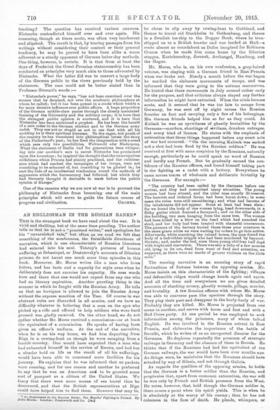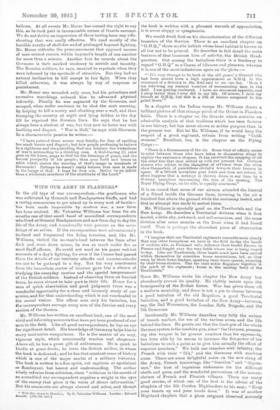AN ENGLISHMAN IN THE RUSSIAN RANKS.*
Tuts is the strangest book we have read about the war. It is vivid and thrilling, but at the same time puzzling. The author tells us that be ie not a " practised writer," and apologizes for his "unvarnished tale," but often as we read we felt that something of the sombreness, the formidable directness of narrative, which is one characteristic of Russian literature had entered into his soul. Tolstoy's pictures of human suffering at Sebastopol, or Dostoievsky's accounts of Siberian prisons, do not haunt one much more than episodes in this book. Moreover, Mr. Morse writes like a man who love. letters, and has taste and a capacity for style even when be deliberately does not exercise hie capacity. He uses words here and there that one would not expect from any one who had no literary aspiration. Another puzzling thing is the manner in which he fought with the Russian Army. He tells us that no foreigner is allowed to join the Russian Army without the express sanction of the Tear. Of course in war abstract rules are discarded in all armies, and we have no difficulty whatever in believing that a man on the spot who picked up a rifle and offered to help soldiers who were bard pressed was gladly received, On the other hand, we do not .gather whether Mr. Morse received a commission—or at least the equivalent of a commission. lle speaks of having been given an officer's uniform. At the end of the narrative, when he is on his way home, we find him departing from Riga in a rowing-boat as though be were escaping from a hostile country. One would have expected that a man who had exhausted himself in the service of Russia, and had but a slender hold on life as the result of all his sufferinge, would have been able to command more facilities for his journey, Be explains that he was informed that no packets were running, and for one reason and another he preferred to say that he was an American and to be granted some sort of passport as a citizen of the United States. We fancy that there were more means of sea travel than be discovered, and that the British representatives at Riga could have helped him to fled them. However that may be.
Ignotialmain M t;. ittwiart Rsintree: Ten Months' righting in Poland, By John Morn. Loudon s Dunkworth and Co. [Vail he chose to slip away by rowing-boat to Gothland, and thence to travel vie/ Stockholm to Gothenburg, and thence in a Swedish ice-ship to the Dogger Bank, where he tran- shipped on to a British trawler and was landed at Hull—a route almost as roundabout as Defoe imagined for Robinson Graeae when he made him come home by the Siberian steppes, Kertehemskoy, Jarensk, Archangel, Hamburg, and the Hague.
lifr. Morse, who is, on his own confession, a grey-haired veteran, was staying with a German friend in East Prussia when war broke out. Nearly a month before the war began he marked the elaborate movements of troops, and was informed that they were going to the autumn manoeuvres. He hinted that these movements in July seemed rather early for the purpose, and that criticism always stayed any further information he might have extracted. When the crisis became acute, and it seemed that he was too late to escape from Germany, he was sent off by night across the Russian frontier on foot and carrying only a few of his belongings. His German friends helped hint so far as they could. At &distill he was an eyewitness of ghastly brutalities by the Germans—murders, shootings of eiviliane, drunken outrages, and every kind of licence. He states with the emphasis of reiteration that those things happened before any overt arta of war had occurred. On the morning Kalisoit wee sacked not a shot bad been fired by the Russian soldiers." He was received at first with some suspicion by the Russians, naturally enough, particularly as he could speak no word of Russian and hardly any French. But he gradually earned the ems fidenee of the Russian officers, and found himself taking part in the fighting as a cadet with a battery. Everywhere he came across traces of wholesale and deliberate brutality by the Germans. For example :— " The country had been raided by the Germans before our arrival, and they had committed many atrocities. The young women had been abused, and the older one, cruelly ill-treated, The hamlets and isolated farms had been burnt down; in 101130 oases the ruins were still smouldering; and what had become of the inhabitants did not appear. Some at least had been slain: for we found the body of one woman lying, head downwards, in a filthy gutter which drained a farmyard ; and on the other side of the building, two men hanging from the same tree. The woman had been killed by a blow on the head which had mashed the skull, and her body had been treated with shameful irreverenee. The gunners of the battery buried these three poor creatures in the same grave while we were waiting for orders to go into notion. Afterwards, while searching the ruined house, the men found the body of a bed-ridden cripple who had been murdered by bayonet- thrusts; and, under the bed, were three young children half dead with frightand starvation. There was also a baby of a few months old, lying in its cot, dead from want of food and attention, we supposed, as there were no marks of grosser violence on the little mite."
The ensuing narrative is an amazing story of rapid fluctuations of fortune between the opposing armies. Mr. Morse insists on this characteristic of the fighting; villages and defensible ridges would change hands again and again, And all the time and everywhere we are given detailed accounts of shacking misery, ghastly wounds, pillage, murder, and brutality. A few Russian officers with whom Mr. Morse was able to converse pass like spectres through the story. They play their part and disappear in the burly-burly of war. Probably they are killed. Mr. Morse is projected from one scene to another, and serves with horse and foot and with a Red Cross party. At one period he was employed to seek information among the prisoners, many of whom talked English. Be was involved in the Russian retreat in East Prussia, and elaborates the importance of the battle of Suvalki, which he writes of as an unreported disaster for the Germans. He deplores repeatedly the presence of strategic railways in Germany and the absence of them in Russia. He thinks that if the Russians had had the equivalent of the German railways, the war would have been over months ago. As things were, be maintains that the Russians should have attacked by way of Silesia, and not through Galicia.
As regards the qualities of the opposing armies, he holds that the German is a better soldier than the Russian, and prophesies that, apart from economic exhaustion, the war will be won only by French and British pressure from the West. He notes, however, that, bold though the German soldier is, there comes a point when his spirit yields. This is when he is absolutely at the mercy of his enemy ; then he has not calmness in the face of death. He pleads, whimpers, or
bellows. At all events Mr. Morse has earned the right to say this, as he took part in innumerable scenes of frantic carnage. We do not derive an impression of there having been any rifle- shooting that was really effective. We read mostly of the horrible results of shell-fire andof prolonged bayonet fighting. Mr. Morse ridicules the pronouncement that opposed masses of men cannot remain within bayonet's length of one another for more than a minute. Another fact he records about the Germans is their marked tendency to suicide and insanity. The Russian soldiers, he says, resorted to reprisals when they were inflamed by the spectacle of atrocities. But they had no natural inclination to kill except in fair fight. When they killed otherwise, it was always by way of response or punishment.
Mr. Morse was wounded only once, but his privations and excessive marchings reduced him to advanced physical infirmity. Finally he was captured by the Germans, and escaped, when under sentence to be shot the next morning,
by helping to kill a sentry and climbing over a wall, and then tramping the country at night and lying hidden in the day till he regained the Russian lines. He says that he has always been a student of war, but that now he hates war with loathing and disgust. " War is Hell," he says with Sherman. In a characteristic passion be writes :—
" I have painted these scenes very faintly, for fear of exciting too much horror and disgust; but how people professing to believe in a righteous and sin-punishing God can tolerate the wickedness of war is astounding to a thinking man. A God-fearing (I) ruler goes ou his knees, prays to God for the blessings of peace, and the honest prosperity of his people ; then goes forth and issues an edict which causes the marring of God's image in hundreds of thousands! Perhaps he doesn't really believe that man is made in the image of God. I hope he does not. Better be an infidel than a wholesale inurderor of the similitude of the Lord."















































 Previous page
Previous page